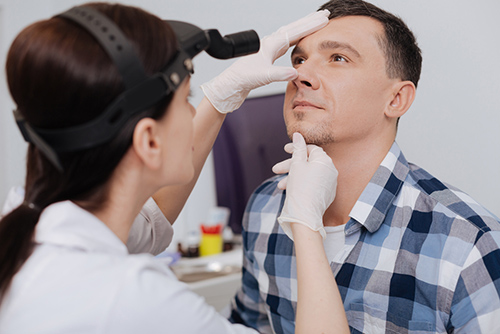
Empty nose syndrome (ENS) is a clinical nasal syndrome that prevents an individual from being able to contract proper airflow to and from their nasal cavities. This syndrome is particularly complex, however, as those affected by it do not have anything obscuring their nasal passages, but feel as though they do. In fact, ENS is such a controversial topic amongst doctors, that it wasn’t taken seriously until individuals suffering from this inconspicuous syndrome became prone to committing suicide.
What Causes Empty Nose Syndrome?
Nose Injuries
During a nose injury, an individual’s turbinate receptors can become traumatized. This can cause their ability to sense airflow to falter, making them feel as though they cannot breathe.
Nasal Surgery
Most people are born with a nose misalignment; however, some cases are worse than others. Those in need of a septoplasty surgery or turbinate reduction can experience side effects after the surgery is complete. While trying to rectify an existing breathing issue, there are seldom few who encounter ENS, which irrevocably causes their breathing-impairment to worsen.
How Can Empty Nose Syndrome Impact an Individual’s Everyday Life?
While ENS is rare, it is a very serious syndrome, as the constant feeling of lacking sufficient airflow can cause an individual’s mental health to be targeted. Empty nose syndrome has an array of symptoms that can drastically affect one’s quality of life. The symptoms of ENS consist of the following:
- Nose bleeds
- Nasal dryness
- The feeling of constant suffocation
- Inflammation and discomfort
- Insomnia
- Nasal sensitivity
- Headaches
- Inability to taste or smell
- Depression
- Anxiety
- Sensitivity to cold
If Left Untreated, What Complications Can Empty Nose Syndrome Cause?
Due to ENS’s severe symptoms, an individual’s unwillingness to seek solutions can have a direct impact on their mental health. Other than that, the overuse of saline sprays and over-the-counter nasal decongestion treatments can negatively impact needed mucus in the nasal concha, which can leave it susceptible to hazardous bacteria.
How Can Empty Nose Syndrome Be Treated?
Unfortunately, a lack of understanding and research on this matter have left any long-term cures obsolete. However, there are many short-term treatments that can offer some relief from more pressing symptoms. For instance, living in a warmer climate and incorporating a humidifier into one’s household can reduce the sensitivity brought forth by cold air. Seeking the expertise of an otolaryngologist and having routine antibiotic nasal sprays introduced into one’s nasal cavity can keep inflammation and pain at bay. Moreover, investing in a CPAP machine to enhance one’s breathing during nighttime can create better grounds for a full night’s sleep. While surgical cures are currently underway, results are not guaranteed as of yet. However, the symptom of suffocation can be relieved by having a cellular dermis implanted below the nasal cavity.
How to Live With Empty Nose Syndrome
For now, seeking the recurring expertise of an Ear, Nose and Throat doctor and staying up to date with up-and-coming ENS cures are some of the only options available. Should depression and anxiety become adamant in the life of ENS sufferers, seeking the professional help of a therapist can also be beneficial? There are many potential ENS cures underway, however, many are experimental at the moment.
At Houston Sinus and Allergy, Dr. Nguyen is a national Ear, Nose and Throat expert and Houston Sinus and Allergy has more than a decade of experience in treating ear infections. We use the latest technology and vast experience to reduce pain and prevent other long-term effects caused by ear infections.
You can reach us by calling (832) 237-7777, or fill out the form at the top of the page to book an assessment to start feeling better!
